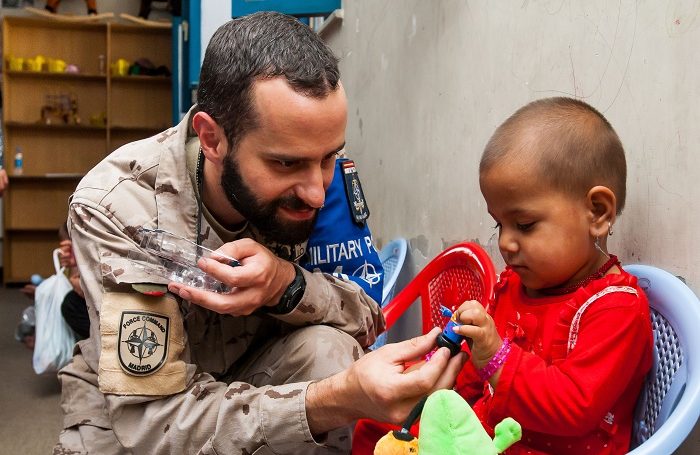
Against a dusty backdrop, three Afghan girls with colourful scarfs covering their faces huddle together. As the camera zoom in, we see a tear fall down one of their eyes. They look petrified. The narrator informs us that their father has said they have been ‘crying for weeks’. The sinister background music contributes to a growing sense of unease. The Taliban are the villains. This is the opening sequence of the ‘Women’s Struggle’ section of NATO’s interactive web documentary, Return to Hope. This short film clip introduces Wadood Pedram, an Afghan man and women’s rights activist. It was his shock at the treatment of women and girls by the Taliban which led him to take up this role. He is their saviour. This opening plays into a particular conception of the masculinist protection logic, whereby women are victims in need of saving.
In this blog post, I evaluate Return to Hope against the North Atlantic Treaty Organisation (NATO) policy on Women, Peace and Security (WPS). I expand further on one of the headline findings of an article I published in Media, War and Conflict. I argue that it is not enough merely to commit to incorporating WPS into public diplomacy, rather consideration should be given to the ways in which such initiatives are gendered from the outset. Not doing so risks reinforcing, rather than challenging the status quo and contributing to regressive gendered outcomes.
The WPS agenda is encapsulated in UN Security Council Resolution (UNSCR) 1325 and the seven follow-up resolutions. It acknowledges both the disproportionate impact of conflict on women, and their crucial role in resolving it. It was intended to transform international peace and security through challenging its gendered construction. Yet, in so doing women are painted as both victims and agents of change, roles which appear difficult for any individual to reconcile together. WPS should be understood as more than the sum of the Security Council Resolutions. Its meaning remains contested and changing at a local, national and international level. In this context, NATO’s engagement with WPS agenda is particularly pressing. NATO has used WPS instrumentally, for example, as a means to increase operational effectiveness. It is therefore unsurprising that the 2011 and 2014 NATO/EAPC Policy on WPS included a focus on increasing the visibility of NATO’s engagement with the agenda as a public diplomacy tool. This framed WPS as of instrumental use.
Return to Hope therefore offers an interesting case study in the integration of WPS into NATO public diplomacy. It was released in 2014 to coincide with the draw-down of NATO troops from Afghanistan. It was also three years after NATO extended its policy on WPS to cover Public Diplomacy. The web documentary has won awards and is in many ways a masterpiece of innovation in digital diplomacy. However, it falls short on living up to the essence of WPS, even if it complied with NATO policy on WPS. WPS was approached at best as a ‘tick-box’ exercise, leaving unchallenged gendered stereotypes of Afghanistan and Afghan women. The result was a web documentary underpinned by a particular masculinist protection logic, which missed an opportunity to challenge NATO’s long established gendered approach to public diplomacy.
Since the release of Return to Hope NATO has revised its policy on WPS. This has seen a shift away from the solely ‘tick-box’ approach to public diplomacy. It now includes a commitment to ensure ‘WPS priorities’ are integrated into all public diplomacy initiatives (NATO, 2016). This is welcome progress, although it is problematic that no detail is given on what specifically these priorities are. We can also see that WPS priorities are treated as something separate from a gender perspective in NATO/EAPC policy. This could be a positive separation, given that for NATO, a gender perspective is as a tool to increase operational effectiveness. It could mean a move away from an instrumental engagement with WPS to one supportive of more substantive change to gendered representations of international peace and security. So while some progress has been made, NATO must work towards clarifying and strengthening provision on public diplomacy in future revisions of its policy on WPS. The first step would be a more transparent account of what NATO considers WPS priorities to be.
We should welcome the integration of WPS into public diplomacy as core constituent of international politics; however, consideration needs to be given to the way in which this is realised. The aim must be to transform practice through better representing women’s agency, rather than reinforcing regressive gendered logics.
Further Reading on E-International Relations
- How Often Does the UN Security Council Use a Gender Lens? Not Often Enough
- Afghan Women in Geopolitical Imaginaries: Between NATO and India
- Opinion – It’s Time to Redefine Gender Mainstreaming
- Opinion – The NATO Madrid Summit and the Alliance’s New Dawn
- Opinion – As a NATO Member Finland Will Be a Security Provider
- Women, Peace and Security after Europe’s ‘Refugee Crisis’